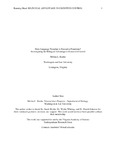Does Language Translate to Executive Functions? Investigating the Bilingual Advantage in Executive Control (thesis)

View/
Author
Knabe, Melina L.
Subject
Washington and Lee University -- Senior Thesis in Neuroscience
Bilingualism -- Research
Executive functions (Neuropsychology) -- Testing
Metadata
Show full item recordDescription
Thesis; [FULL-TEXT FREELY AVAILABLE ONLINE] Melina L. Knabe is a member of the Class of 2017 of Washington and Lee University. Given that twenty-percent of the U.S. population speaks a language other than English at home, it is imperative to assess the effect of a second language on brain structure and function. The bilingual advantage hypothesis claims that command over two languages leads to enhanced non-linguistic cognition. The need of a bilingual to maintain both languages active simultaneously, inhibit one, and flexibly switch between both may transfer to executive control (EC) functions. The present study investigates the effect of mono- and bilingualism on inhibitory control and cognitive flexibility across age groups. Implementing an online format, mono- and bilinguals (ages 18-89, n = 334) of diverse language parities completed a language background and demographic questionnaire. EC performance was assessed using a Simon task, task-switching paradigm, and directed forgetting (DF) paradigm. In addition, Shipley-II vocabulary and block patterns tests served to assess crystallized and fluid intelligence. It was hypothesized that bilinguals would outperform monolinguals on all tasks and that this difference would be most pronounced in older ages. Further, it was hypothesized that amongst bilinguals, age of active onset, language proficiency, and amount of language switching would be most predictive of outcomes. A moderated regression showed that after controlling for various lifestyle factors, middle-aged bilinguals showed faster reaction times than their monolingual counterparts, suggestive of a Bilingual Executive Processing Advantage (BEPA) rather than a Bilingual Inhibitory Control Advantage (BICA). Results also revealed that this trend disappeared in the task-switching paradigm, a more demanding task. Finally, young bilinguals showed greater item recall on the DF paradigm, suggesting improved maintenance of information in the presence of interfering information. Multiple hierarchical regressions revealed no significant predictive value of various bilingual experiences on task outcomes, except for a putative role of age of active onset on Simon effect outcomes.